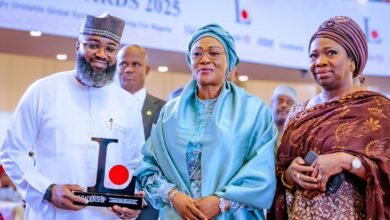
- Azerbaijan invites Etisalat to collaborate on the World Telecommunication Development Conference in Baku.
- MTN Nigeria warns of a deep crisis in the telecom sector, calling for urgent tariff reforms.
- Nigerian telecom operators report double-digit growth in Q2 2025 data revenue.
- NCC launches 2025 Corporate Governance Guidelines to boost transparency and investor confidence.
Azerbaijan Invites Telecom Giant Etisalat for Telecommunication Development Conference Collaboration
Azerbaijan is exploring potential cooperation with Etisalat, a leading technology and telecommunications company from the UAE. During a recent visit to the UAE, Azerbaijani Minister of Digital Development and Transport, Rashad Nabiyev, announced this initiative on his social media platform. He also extended an invitation to Etisalat to participate in the upcoming World Telecommunication Development Conference, set to take place in Baku.
Nabiyev expressed gratitude to Jassem Mohamed, Chairman of Etisalat, for sharing valuable insights gained from COP28 in Dubai, which will assist Azerbaijan in organizing COP29 in Baku. This collaboration highlights Azerbaijan’s commitment to enhancing its telecommunications sector while leveraging global expertise for future events.
MTN Takes Proactive Measures to Ensure the Sustainability and Resilience of the Telecommunications Landscape
Nigeria’s telecommunications sector, which has flourished over the past two decades following liberalization, is now confronting serious challenges that jeopardize its stability and growth. Karl Toriola, CEO of MTN Nigeria, voiced his concerns about the “deep crisis” affecting the industry during a recent telecom investment forum hosted by Financial Derivatives Company in Lagos.
He noted that while the sector has seen remarkable expansion and increased access to communication services, it now grapples with rising operational costs accompanied by pricing structures that are no longer sustainable. This situation raises alarms for both telecom companies and consumers, as the viability of essential services comes into question.
During his address, Toriola stressed that a price increase is not merely an option but an “absolute necessity” for the industry’s recovery. He underscored the importance of addressing the imbalances caused by inflation and other economic pressures, which are squeezing profit margins and adversely affecting service delivery. By advocating for a reevaluation of pricing strategies, Toriola hopes to initiate critical discussions among stakeholders that would enable the telecom sector to stabilize and continue fulfilling its role as a key driver of Nigeria’s economy.
His remarks reflect a growing sentiment among industry leaders about the urgent need for proactive measures to ensure the sustainability and resilience of the telecommunications landscape in Nigeria.
Operators Record Double-digit Growth in Data Revenue for the Second Quarter of 2025.
Telecom operators in Nigeria are experiencing unprecedented revenue growth, particularly from data services, fueled by the country’s increasingly mobile-centric population. With a youthful demographic that heavily relies on mobile internet, the demand for data has skyrocketed, propelling the earnings of major telecommunications companies. Recent financial reports from MTN Nigeria and Airtel Nigeria illustrate this trend, as both operators have recorded remarkable double-digit growth in their data revenue for the second quarter of 2025.
In Q2 2025, MTN Nigeria reported a staggering 85.6% increase in data revenue, soaring from N377 billion in the same period last year to N701 billion. This impressive growth underscores the rapid expansion of mobile internet consumption in Nigeria and reflects the operators’ ability to capitalize on the changing landscape of communication. As data becomes an essential component of everyday life for millions of Nigerians, telecom companies are not only solidifying their market positions but also adapting their strategies to meet the evolving needs of a digitally engaged population. This trend highlights the significant potential for further investment and innovation within Nigeria’s telecommunications sector, promising exciting opportunities for both consumers and service providers alike.
NCC Launches 2025 Guidelines on Corporate Governance
The Nigerian Communications Commission (NCC) has launched the 2025 Guidelines on Corporate Governance, signifying a pivotal moment for the telecommunications industry in Nigeria. This launch represents a commitment to establishing stricter standards and enforcement mechanisms aimed at enhancing crucial aspects such as audit standards, risk management, and transparency within the sector. As the telecommunications industry is integral to Nigeria’s economic growth, these guidelines are expected to address various challenges that have historically plagued the sector, including issues related to accountability and ethical practices.
The current valuation of the Nigerian telecom industry stands at an impressive $9.52 billion in 2025, with forecasts indicating a robust growth trajectory that will elevate this figure to $11.97 billion by 2030. This growth, reported by market analysis firm Mordor Intelligence, underscores the critical role of telecommunications in driving Nigeria’s digital economy. As the industry continues to expand rapidly, the stakes for maintaining ethical compliance and solid corporate governance practices are becoming increasingly significant.
During the workshop and formal launch of the guidelines held in Lagos, Dr. Aminu Maida, the executive vice chairman of the NCC, articulated that the new corporate governance framework goes beyond merely adhering to regulatory requirements. It emphasizes a holistic approach to ensuring the long-term sustainability of telecommunication businesses and networks. In addition to fostering an environment of compliance, the initiative seeks to inspire greater confidence among investors. This assurance is crucial, given that a well-governed and transparent sector is likely to attract more investments, which, in turn, can contribute to the broader economic development of the country.
NCC’s proactive steps in implementing these guidelines can be seen as a strategic move to safeguard the interests of consumers, investors, and the telecommunications sector as a whole, in light of the evolving dynamics of the digital economy.




